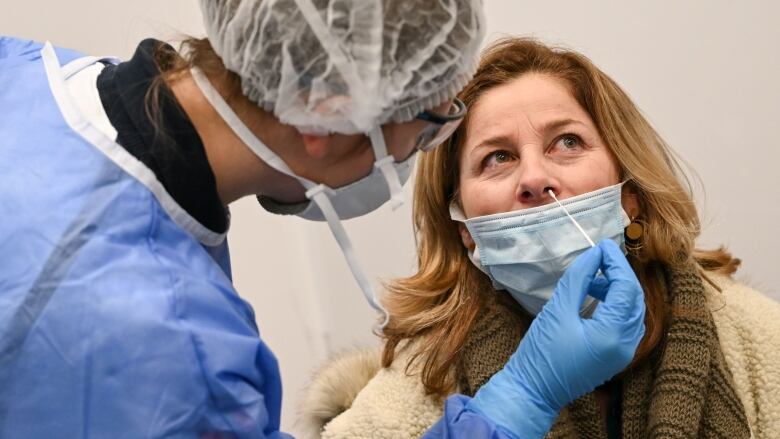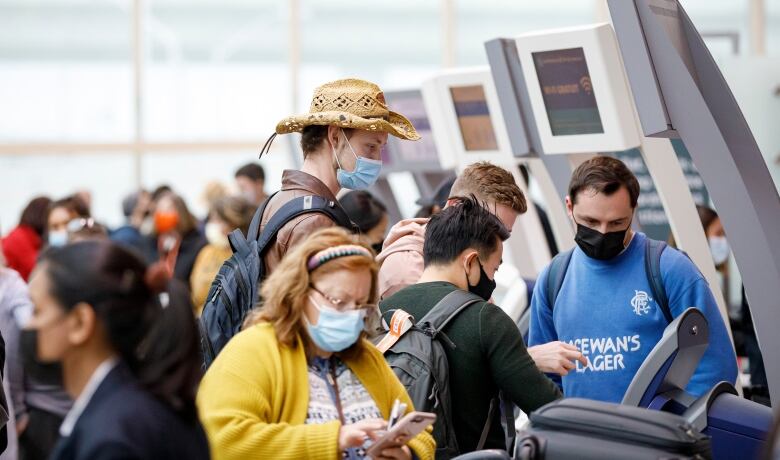Ottawa dropping pre-arrival PCR test for travellers as of Feb. 28
Travellers will still have to take a test to return, but can opt for a cheaper antigen test

Travellers entering Canadawill no longer have to take a pre-arrival molecular test such as a PCR as of Feb. 28,Health Minister Jean-Yves Duclosannounced Tuesday.
Travellers will still be required to take a pre-arrival test, but they can instead opt for an authorizedrapid antigen test taken no more than one day before their scheduled flight or arrival at the land border.
Molecular tests will still be accepted, but antigen tests are typically cheaper and can provide results within minutes.
Also starting Feb. 28, unvaccinated children under the age of 12 entering Canada with fully vaccinated parents will no longer have to avoid schools, daycare or other crowded settings for 14 days,said Duclos.
Currently, travellers entering Canada must show proof of a negative molecular test taken within 72 hours of their departing flight or planned arrival at the land border.
Fully vaccinated travellersmay also be randomly selected for a PCR test upon arrival.Duclos said its arrival testing program will remain in effect, but, as of Feb. 28, those selected for testingwill no longer have toquarantine while waiting for their results.

Ottawa will reassess travel measures
The government also announced plans to lift its current advisory against non-essential travel abroad.
Duclos said the government is making the changes because of improving pandemic conditions.
"We have passed the peak of the latest wave driven by the Omicron variant," he said.
"In addition, after two years of following individual public health measures, such as getting vaccinated, wearing masks, keeping our distance and staying at home if sick, Canadians know what to do to keep themselves and each other safe."
Duclos added that travelmeasures could change depending on the direction of the pandemic.
If conditions continue to improve, he said, further testing measures could be dropped, such as the testing requirement for Canadians visiting the United States for short trips under 72 hours.
The government made no mention of dropping its rulethat air passengers who test positive while abroad must wait at least 10 full days before entering Canada.
"I want to underscore that Canadians should still exercise caution when traveling abroad," said Duclos."There is still the real risk of becoming sick or stranded."
Travel rules facecriticism
Over the past several months, members of the travel industry and some physicians have lobbied the government to nix all testing requirements for fully vaccinated travellers.
People must pay for their pre-arrival molecular test, which can cost hundreds of dollars. It can also be difficult to get test results within the specified 72 hours, as they typically must be processed in a lab.
Meanwhile, the government is spending millions of dollars to randomly test thousands of vaccinated travellers daily upon arrival.
Last week, infectious disease doctor Zain Chagla took part in a news conference where he argued that both the pre- and post-arrival tests are an unnecessary expense, because Omicron has already spread across Canada.
On Tuesday, Chagla said in an interview that allowing travellers to take a rapidantigen test is a step in the right direction, butquestioned how useful the less sensitive test will be in preventing the spread of COVID-19.
"You're likely not going to pick up a tonof cases this way," said Chagla, a professor of medicine at McMaster University in Hamilton. "You'll address a little bit of an extra level of protection for the plane ride, but it certainly won't be a lot."

However, Dr. Prabhat Jha, an epidemiologist at St. Michael's hospital in Toronto, applauded the government's move. He said antigen tests are ideal because they can be done closer to when a traveller begins their journey home.
"Having the testing as close to departure [as possible] is a reasonable strategy and rapid antigen tests actually work quite well for that."
He said that acquiring an antigen test will be more convenient and cheaper for travellers. They typicallycost well under $100.
Snowbird predicts rapid tests will become a hassle
Although the antigen test may be more convenient, Canadian snowbird David Fine said he's not entirely satisfiedwith the change to the pre-arrival test requirement.
Fine, who is spending the winter in an RV in Yuma, Ariz., predicts booking an antigen test will still be a hassle when he drives back to Hepworth, Ont., in early April, because thousands of returning snowbirds that month will be booking the same type of test.
"I was personally disappointed," he said ofthe government's announcement. "It's going to be hard to find a rapid test."

Fine argues that the government should instead entirely nix the pre-arrival test requirement for fully vaccinated travellers.
"They should trust Canadians, especially the ones who have three vaccines," he said. "We're cautious people."
Some countries, such as theUnited KingdomandDenmark, have dropped all test requirements for fully vaccinated travellers.
The government also announced on Tuesday that, come Feb. 28, international flights will be allowed to land at any international Canadian airport. The government previously barred international flights from landing at some airports due to the pandemic.
With files from Ashley Burke and David Cochrane













_(720p).jpg)


 OFFICIAL HD MUSIC VIDEO.jpg)
.jpg)



























































































